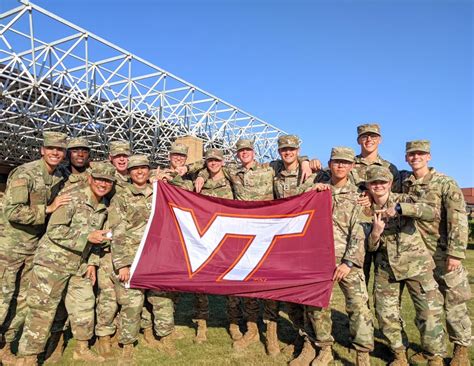Introduction
Virginia Tech’s Army Reserve Officers’ Training Corps (ROTC) program has a rich history of producing exceptional leaders who serve with distinction in the United States Army. As one of the top ROTC programs in the country, Virginia Tech ROTC offers a comprehensive and transformative experience that prepares students for a rewarding career in the military and beyond.

Mission and Vision
The mission of the Virginia Tech ROTC Army program is to “develop and commission principled leaders of character for service in the Army and as citizens.” The program’s vision is to be “the premier ROTC program in the nation, recognized for excellence in developing technically proficient, physically fit, and morally strong leaders.”
Benefits of the Program
Students who join the Virginia Tech ROTC Army program enjoy a wide range of benefits, including:
- Leadership Development: ROTC provides unparalleled opportunities to develop leadership skills through hands-on training, simulations, and field exercises.
- Scholarship Opportunities: ROTC offers generous scholarships to qualified students, covering the cost of tuition, fees, and books.
- Financial Assistance: Cadets receive a monthly stipend to cover living expenses and other costs.
- Experiential Learning: ROTC provides students with real-world experiences through practical exercises and internships.
- Professional Development: ROTC graduates enter the workforce with a strong foundation in leadership, teamwork, and problem-solving.
Program Structure
The Virginia Tech ROTC Army program consists of four years of study and training:
- Basic Course (Freshman and Sophomore Years): This introductory phase focuses on building a strong foundation in military science and leadership principles.
- Advanced Course (Junior and Senior Years): Cadets develop their leadership skills further, engage in specialized training, and prepare for commissioning as officers in the Army.
Training and Activities
ROTC cadets participate in a variety of training activities, including:
- Rifle Marksmanship: Cadets learn proper firearm handling and marksmanship skills.
- Physical Training: Cadets maintain a high level of physical fitness through regular workouts and conditioning.
- Leadership Exercises: Cadets participate in field exercises, simulations, and small group activities to develop their leadership abilities.
- Military Knowledge: Cadets study military history, strategy, and tactics.
Career Opportunities
Graduates of the Virginia Tech ROTC Army program can pursue a wide range of career paths in the Army, including:
- Line Officers: Officers lead and manage units, carry out missions, and ensure the well-being of soldiers.
- Staff Officers: Officers provide specialized support in areas such as administration, intelligence, and logistics.
- Technical Officers: Officers with advanced technical skills serve in specialized roles, such as engineers, cyber experts, and medical personnel.
Testimonials from Graduates
“ROTC has given me the confidence and leadership skills to succeed in both the military and the civilian world.” – Captain Sarah Jones, U.S. Army
“The training and mentorship I received in ROTC prepared me for the challenges and responsibilities of leading soldiers.” – Major John Smith, U.S. Army
Pain Points and Motivations
Pain Points:
- Rising costs of higher education
- Limited opportunities for hands-on leadership development
- Lack of clarity about career paths after college
Motivations:
- Desire for a meaningful career serving the country
- Interest in developing leadership skills
- Financial incentives and scholarship opportunities
Effective Strategies
To address these pain points and motivations, the Virginia Tech ROTC Army program employs several effective strategies:
- Targeted Recruitment: Reach out to potential recruits from diverse backgrounds and offer personalized assistance.
- Mentoring and Advising: Provide cadets with dedicated mentors and academic advisors to guide their progress.
- Experiential Learning: Offer a range of practical experiences to enhance leadership skills and develop professional competence.
- Financial Aid and Support: Provide generous scholarships and financial assistance to make the program accessible to all qualified students.
Frequently Asked Questions (FAQs)
1. What are the eligibility requirements for the ROTC program?
- Be a full-time student at Virginia Tech
- Be a U.S. citizen or permanent resident
- Be physically and mentally fit
- Meet academic and medical eligibility standards
2. What is the commitment required?
- Cadets commit to serve on active duty for three years after graduation.
- Participation in ROTC activities is required two to three days per week.
3. Do I have to join the military after graduation?
- Yes, ROTC graduates are required to serve on active duty for three years.
- There is an option to pursue graduate studies or attend medical school before serving.
4. What is the job market like for ROTC graduates?
- ROTC graduates are highly sought-after by employers in both the military and civilian sectors.
- Leadership, teamwork, and problem-solving skills developed in ROTC are valued in a wide range of industries.
5. What is the difference between Basic and Advanced Course?
- Basic Course (freshman and sophomore years) focuses on building a foundation in military science and leadership principles.
- Advanced Course (junior and senior years) develops leadership skills further, engages in specialized training, and prepares cadets for commissioning as officers in the Army.
6. What is the best way to prepare for ROTC?
- Maintain a high level of physical fitness.
- Develop strong academic skills.
- Seek out opportunities to demonstrate leadership ability.
7. What is the financial cost of participating in ROTC?
- ROTC scholarships and financial aid cover the cost of tuition, fees, and books.
- Cadets also receive a monthly stipend to cover living expenses and other costs.
8. What are the career opportunities for ROTC graduates?
- Line Officers: Lead and manage units, carry out missions, and ensure the well-being of soldiers.
- Staff Officers: Provide specialized support in areas such as administration, intelligence, and logistics.
- Technical Officers: Serve in specialized roles, such as engineers, cyber experts, and medical personnel.
